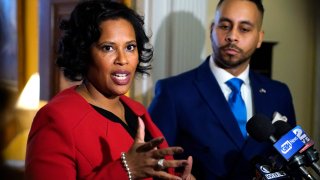
Massachusetts Gov. Maura Healey signed an executive order Monday creating a new panel tasked with advising the administration on ways to help support empowerment efforts in the state’s Black community.
The 33-member Governor’s Advisory Council on Black Empowerment held its first closed-door meeting at the Statehouse on Monday.
The panel will offer Healey guidance on issues related to the economic prosperity and wellbeing of the Black community, including education, health care, housing and workforce development.
Healey said the state’s Black residents make tremendous contributions to the state, but too often face systemic barriers that hold them back.
Get Boston local news, weather forecasts, lifestyle and entertainment stories to your inbox. Sign up for NBC Boston’s newsletters.
She said the council will help advise her on what “policies and levers that we can use within our administration to address issues of racial disparities which through COVID in particular were only exacerbated.”
“As someone who was a civil rights lawyer, this is something that’s near and dear to me,” she said at a Statehouse news conference.
One of the council’s co-chairs, Tanisha Sullivan, said its members are excited to get to work and to hear from residents from throughout Massachusetts.
She said the administration has been “incredibly intentional” about building a diverse team within the Statehouse as well as pulling people in from outside of it.
“We are under no illusion that we’re going to solve all of the problems — in fact that is not our intention. Our intention is to identify and be focused on a very discrete set of challenges to be able to go deep to identity solutions that are data-driven and research-based,” said Sullivan, who serves as president of the NAACP Boston.
Massachusetts — and Boston is particular — have a checkered history when it comes to struggles with racism, particularly in the 1970s, when ugly scenes arising from the city’s struggles with school busing played out on television screens across the county.
More recently, members in the Black community in Boston have faced new challenges as the city’s surging growth has increased housing costs, forcing some long-time residents from their homes.
Get updates on what's happening in Boston to your inbox. Sign up for our News Headlines newsletter.
“What we know is that we are not the Massachusetts of the 1950s, the 1960s, the 1970s. I do want to make sure that there is an understanding that there has been progress,” Sullivan told reporters. “But there are still disparities that must be tackled.”
Sullivan’s co-chair, Anthony Richards, said the state finds itself in a unique moment to make progress to close the racial equity gap.
“This isn’t a Boston issue — this is a Massachusetts opportunity to convene this group at a time like this where there is a significant amount of government subsidy, excess tax revenue (and) a social awakening,” said Richards, vice president of equitable business development at the Massachusetts Housing Finance Agency.
“With all of those things, we’re hoping the stars are aligned to continue to narrow opportunity divides,” he added.
Healey isn’t the first governor to convene such a panel. Her predecessor, Republican Charlie Baker, also created a Black Advisory Commission to counsel his administration on issues related to the economic prosperity and wellbeing of the state’s Black community.

